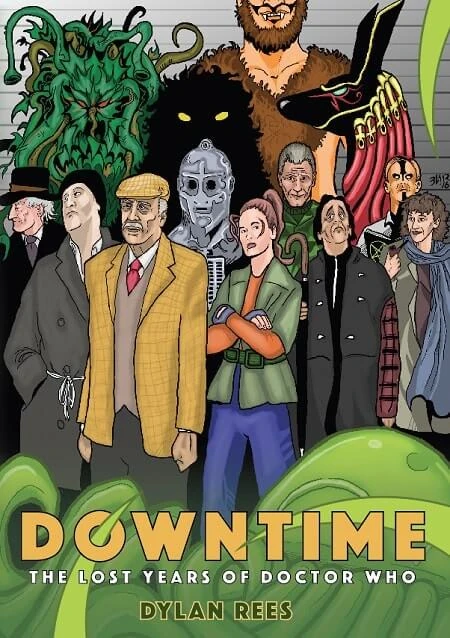Downtime: The Lost Years of Doctor Who

|
|
Obverse Books Downtime: The Lost Years of Doctor Who |

|
| Author | Dylan Rees |  |
| ISBN | 1 909 03142 5 | |
| Publisher | Obverse | |
| Published | 2016 |
| Summary: During the interregnum between the Seventh Doctor’s final adventures in 1989 and the relaunch of the series in 2005, BBC One broadcast only three new Doctor Who stories – a TV movie and two comic versions raising money for charity. Elsewhere, books and comic strips (and eventually licensed audios) kept the flame alive, but it seemed the BBC had little interest in reinvigorating the franchise on television. Meanwhile, seemingly almost forgotten, some of the Doctor's friends, enemies and legally dubious clones continued their adventures in the direct-to-video market and their own spin off audio adventures, written by and starring many of the cast/crew who had worked on the original series, and several who would work on the relaunched version. |
A Review by Thomas Tilley 28/4/24
Downtime - the Lost Years of Doctor Who by Dylan Rees covers the time period between the old and new series of Doctor Who covering the various audio and straight-to-video titles of the era. The book is organized in chronological order starting from Wartime up to the then recent PROBE - When to Die, covering series such as Kaldor City, The Minister of Chance, Faction Paradox, The Stranger and PROBE by Reeltime pictures, BBV and Magic Bullet productions.
This book was very interesting, as it covers the material that we fans kind of take for granted. It's difficult to imagine now, but back then these low-budget CDs and video were the closest people could get to new Doctor Who for most of the 90s and early 00s. Many people were involved in making modern Who and various modern spinoffs --- like the books and Big Finish --- such as Mark Gatiss and Nick Briggs. They also featured many of the stars from the classic series.
The book is full of little facts, gossip and trivia of the production of the various titles, spin-offs and sequels to films/audios that were not produced, people who were considered for certain titles and other interesting facts and brief reviews of the films/audios as well. For example, in the first Stranger film, Tom Baker and Deborah Watling were originally considered for the main roles, it was filmed in the same location as Attack of the Cybermen, and a member of the production team was stuck in quicksand leaving him trapped in his car overnight.
Most of the material concentrates on BBV and Bill Braggs, as they made well an awful lot of stuff compared to their rivals. The book goes into the various disagreements and fallings out relating to BBV during their various productions. There is even a chapter near the end that covers it, its very interesting and the author takes a neutral/Devil's-advocate-style approach to the various goings/fallings out on, which is good; after all, it takes two to tango, and not everything's black and white, but after you read about another falling out you do start to think how did these people ever find time to make these things?
The book is overall very good, but I do have one or two niggles. The chapter titles are all from songs, which is cute, but it does distract I think. There is no index. There is a part when talking about Mindgame where the author wonders about the the parts that were cut due to time and wonders what they would be like; the unabridged script is an extra on the DVD, so he could have checked. There is a list of all the audios and films at the back giving the year of release, who starred in it, who made it and a brief plot synopsis, which is good, but as the body of the book goes through the same information, a lot of it is repeated. There are parts when the author is interviewing people where you wish the author had asked a follow up question or asked his interviewee to elaborate/clarify on his answer, such as when the various people are talking about their falling out with Bill Braggs, but it is understandable, as interviewing people can be difficult and maybe the author didn't want to risk offending people or didn't think to ask. There are one or two moments when an interviewee gets a detail wrong, which is understandable, but the author doesn't correct it such as when Mark Gatiss says in an interview he wouldn't allow PROBE to get a DVD release . Like I said niggles, small things.
Overall, I found it to be a fascinating book and I recommended it to any fan of the period. 10/10